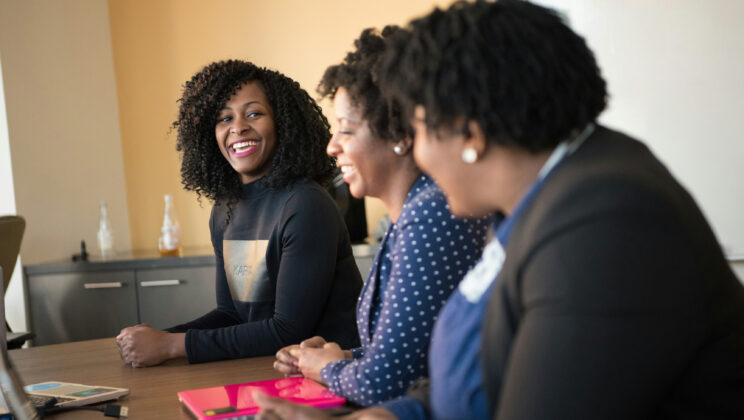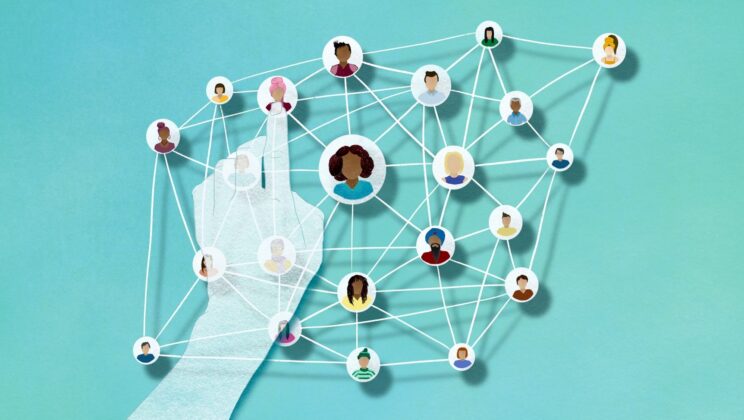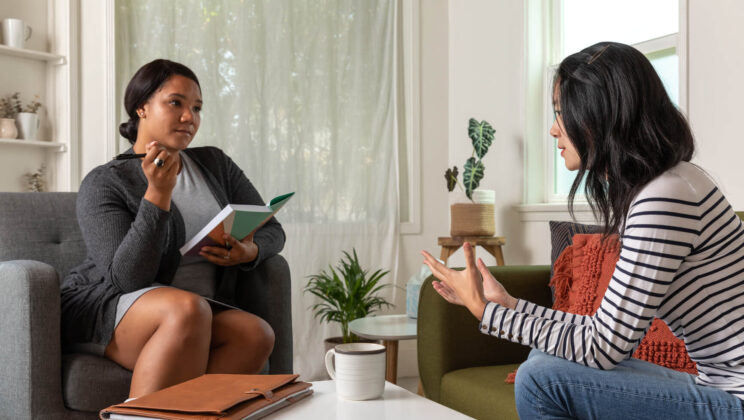Introducing the Lyra Ambassador Program
July 16, 2021
In October 2020, therapist Briahn Badelle, LCSW, stepped into a new role for a pilot project: the Lyra Ambassador Program. The program's goal is to connect Lyra with clinicians who are Black, Indigenous, or People of Color (BIPOC) to discuss their careers, learn about the professional barriers they’ve overcome, and share how Lyra serves clients from different backgrounds—not just those who may have typically had access to therapy.
Briahn played a pivotal role in developing the program, which features several "ambassadors" focusing on opportunities at Lyra. In the following interview, Briahn welcomes the newest cohort of Lyra ambassadors: Marilyn Mercado, LMFT; Nada Othman, MS; and Andrea Rogers, MS, to the team.
Introducing the Lyra Ambassador Program
Briahn: I’m so happy to chat with you today and formally pass the baton. Can you start by telling me about your journeys to become mental health care providers?
Andrea: I’ve always been a coach in some fashion throughout my life. After completing my master’s program, I learned about coaching as a career. I’m continually fascinated by the idea of moving people forward, and coming alongside them on their journey. About three years ago, I decided to make it official and got my mental health coaching certification. One of the first things I learned was that coaching is about asking questions, and I was like, “I have found my happy place.” I was excited to have the opportunity to take the things I love and turn them into a career.
Nada: I was born and raised in Saudi Arabia. When I was growing up, there wasn’t as much awareness about mental and emotional wellness as we see today. As a child I remember internalizing that feeling angry, sad, scared, or stressed was bad. I did my best to avoid those feelings rather than embrace them. In college and throughout different life transitions, therapy and coaching helped me a lot. But it was challenging to find someone with a background similar to mine. I saw the need for more diverse providers, and I wanted to help people who could benefit from coaching, like I did.
Briahn: What inspired you to apply for Lyra's ambassador program?
Marilyn: It’s a great idea! I’m a practicing provider, so I can relate to my professional peers. And I’m excited to connect them to careers at Lyra because I’m really proud to work here. There are so many companies out there with mission statements that don’t match their actions. I wanted to meet therapists in my community and spread the word that Lyra is walking the talk.
Nada: As a company, we’re working to improve the diversity and inclusion of our providers, and I want to be part of that. I initially heard about Lyra from a coach friend who loves working here. Now I want to connect with other coaches like me because I’m so happy to be here and grateful for that introduction to Lyra.
Briahn: How does the Lyra Ambassador Program support Lyra’s diversity, equity, inclusion, and belonging (DEIB) mission and values?
Marilyn: Mental health is for everyone. Ideally, clients should have the opportunity to connect with a therapist who comes from a similar background, with shared experiences and/or the professional training to support them. All of these are goals the ambassador program actively supports. I’ve had clients say they are so happy to receive support from someone who looks like them. It’s important for me to work somewhere that the brand matches the mission.
Briahn: I can relate to that. A majority of my clients have been non-Black BIPOC folks, and they come to me because I can understand some of their experiences.
Andrea: I hear a lot of companies talking about inclusion, and I’m not seeing it. Having representation matters. In the conversations I’ve been part of at Lyra, there’s a passion for what this role looks like and how to do it. Nobody pretends to have the answers. It’s about being willing to explore and leave room for change, growth, and opportunity.
Briahn: Why should BIPOC therapists and coaches consider joining Lyra?
Andrea: Lyra is a safe space. Historically, seeking and receiving care has been a predominantly white space. I have so many clients who open the camera for our appointment and tear up when they see me. If you have the courage to come forward and seek help, the last thing you need to do is explain why. In the past, BIPOC individuals have had to pick themselves up and keep going. I get it. With Lyra, we’re able to create that environment as a provider—to offer that space.
Briahn: The BIPOC therapist community is pretty tight-knit and word of mouth is the best advertisement. If one person has a particularly good (or bad) experience with a company, we might weigh their experience in our decision. It’s also important that we go where we’re celebrated and supported. As a Black woman in America, I was always taught you don’t go anywhere you aren’t wanted. And I believe the same is taught in many BIPOC communities. We also know we are highly sought-after therapists, so we don’t have to partner with anyone who doesn’t respect us in our profession.
Nada: I can relate. I have reached out to people I trust who understand that I’m an immigrant and a woman of color, and would share insights on their own experience with a company. And that made a difference to me.
Lyra doesn’t just talk about diversity—we are taking real steps. We’re serious about this. There are so many organizations putting out mission statements and workshops, but there isn’t any real action being taken. I’ve been in those environments before.
Marilyn: Lyra understands that it’s important to keep growing beyond your caseload. I see that in my consultation groups and opportunities like the Ambassador Program. I also have to mention the free CEU training and schedule flexibility. I’m safe, I feel supported, and this is a company I feel I can retire with.
Briahn: What is your personal goal as a new Lyra ambassador?
Nada: As I network with other BIPOC coaches through this program, I’m thinking about myself. I had such a hard time finding coaches or therapists I could connect to. As a client, what did I look for? We should all have options.
Marilyn: I want to encourage BIPOC therapists who are discouraged by the challenges of this work, who may be experiencing burnout or even trauma, to get excited about their careers again. It’s not just our clients who deserve to grow; therapists do too.
Andrea: When you’re talking about recruiting with BIPOC coaches, there’s this degree of apprehension: When the honeymoon is over, what’s going to be left? To that, I say not only am I inviting you here because I believe in Lyra, but also because I’ve experienced the safe space this company provides. Clients have their “a-ha moments,” and I’m excited that I have had that moment with Lyra, especially as a person of color. There’s so much fear in our daily lives. I want BIPOC coaches to know they don’t have to carry that burden here.
Briahn: We get into this work because we want to make a difference, but these degrees and licenses are not cheap, especially for first generation college students. We want to be able to serve our communities and also be able to take care of ourselves and our families. Being an ambassador was a great experience, and led me to realize that I love recruiting really dope therapists for the Lyra network!
Lyra is striving to diversify its provider network to more accurately reflect and meet the needs of our increasingly diverse client population, while offering a safe, rewarding, and stable career. Visit our Providers page to learn more about our careers.
CONTACT US
If you want help connecting with a therapist, Lyra can assist you. You can get started today if Lyra is offered by your employer. Sign up now.
For employers who want to learn more about how Lyra addresses network adequacy and quality issues, download our white paper on quality or get in touch.
And check in frequently here or follow us on Facebook, LinkedIn, and Twitter for more insights into supporting employees’ mental health.
ABOUT THE AMBASSADORS:
Briahn Badelle is a licensed clinical social worker with over 10 years of experience working with adolescents and adults in the Bay Area. An Oakland native, Briahn has worked as a trauma medical social worker at a local county trauma center as well as at other Bay area hospitals and has also worked at various nonprofits and schools in the Bay Area. To address the need for therapists from traditionally oppressed communities, Briahn opened Thrive Oakland, a multi-cultural, multi-lingual, LGBTQ+ affirming therapy practice in Oakland in 2017 and now works with Lyra as a recruiter in network development where she focuses on recruiting BIPOC and specialty providers.
Marilyn Mercado is certified as a Seeking Safety Therapist emphasizing the links between substance abuse and PTSD and Trauma-Focused Cognitive Behavioral Therapy. Marilyn has received special training in dual focused addiction treatment with individuals and family issues. She earned a Master of Science in Counseling with a specialization in Marriage and Family Therapy from California State University, Northridge.
Marilyn is passionate about working with diverse clients and families so that they may become more aware of the link between the mind and body as they work toward recovery and sobriety, and practices cultural responsiveness and competency with clients and cultivates awareness of stagnant emotions through mindfulness. She believes it is vital to practice mindfulness daily to reduce stress levels and to notice being present in the moment. She believes it is imperative to explore the client’s strengths and passions.
Nada Othman is a certified associate coach with a master’s degree in general leadership and a narrative coach core practitioner. Before working in coaching, she earned a degree in mass communication with a concentration in advertising and then worked in global advertising agencies in Dubai, United Arab Emirates. She moved to the United States nine years ago. She started her coaching career in higher education as an academic coach and then expanded her coaching practice to emotional wellness and leadership coaching.
Nada is passionate about coaching. Using evidence-based techniques, she partners with her clients in a thought-provoking and creative way. Her intention is to guide them in developing strategies that will help them go from where they are in life to where they want to be. Nada always seeks to support her clients through their transitions and challenges and is deeply committed to being present with them and helping them become their best selves.
Andrea Rogers is a certified mental health coach who is passionate about helping people live life to the fullest. She has over 20 years of mental health coaching experience. Andrea has worked with Lyra since October 2020 and loves the experience of coaching across a wide variety of subjects. She is a proud mom of four and it's been said that she and Wonder Woman have never been seen together.
Explore additional blogs

Lyra news
Introducing the Lyra Workforce Mental Health Team

BIPOC
What’s Causing the Shortage of Diverse Mental Health Providers?

BIPOC